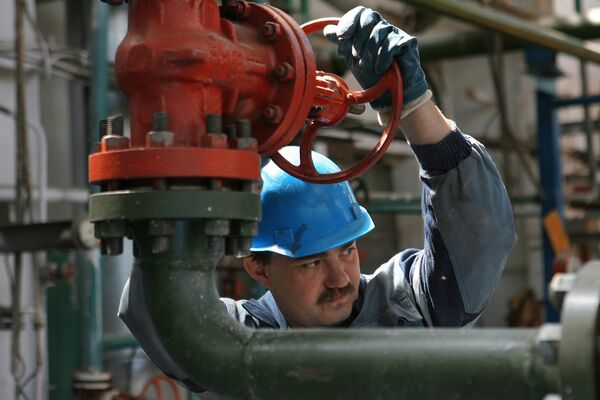MOSCOW. (RIA Novosti economic commentator Oleg Mityayev) - The economic downturn has hurt both the price and the volume of the natural gas Russia exports to Western Europe.
However, some analysts attribute the drop in Russian gas exports to another major reason, Gazprom's inflexible pricing policy, which could eventually lose the gas monopoly its European customers. However, officials at Gazprom do not plan a policy change. Neither do they see any reason to panic.
Deputy Energy Minister Sergei Kudryashov said on June 23 one of the problems with Russian gas exports was the lack of flexibility in liberalized European markets when the competition grows fierce. By Kudryashov's estimate, demand for gas in Europe dropped by a mere 5% in the first quarter, while Russian exports plummeted by nearly 60%.
It transpires that, along with the shortfall in earnings, the key Russian gas exporter lost part of its control of the European gas market to competitors.
The next day, June 24, Gazprom's Deputy CEO Alexander Medvedev did his best to rebut criticism of the monopoly's export policy. He admitted that supplies to Europe at the end of 2008 and beginning of 2009 were cut for reasons beyond their control.
Gazprom's relations with foreign customers are regulated by long-term contracts, where quarterly price adjustments are based on European petroleum prices six to nine months before. In the first half of 2008, oil reached a peak, gas prices also peaked, and so after the relevant time lag, prices reached $500 per 1,000 cubic meters in the forth quarter. The price remained high in early 2009.
That is why Europeans drew more heavily on their underground gas storage tanks. In Medvedev's estimates, they increased the use of previously accumulated fuel by 65% in the first quarter. This move naturally affected Gazprom's earnings along with other gas suppliers, Nigeria and Algeria, but benefited Norway which trades on the spot market for gas, where deals take immediate effect. In addition, Norway then commissioned a huge gas deposit, Ormen Lange.
The Russian-Ukrainian gas conflict also seriously harmed Russia's supplies to Europe, resulting in a 4.5 billion cubic meter shortfall for European consumers.
Nevertheless, Medvedev does not believe Gazprom is losing its grip on the European gas market (of which the Russian monopoly has controlled a quarter until recently), and sees no point in abandoning the existing pricing or contract policy.
Europeans began increasing purchases from Gazprom in April as they needed to refill their storage tanks. Gazprom's prices have stabilized at a fairly acceptable level. The Russian monopoly's latest estimate says the average price for Europe will exceed $280 this year, the same as other suppliers'.
This is why Gazprom pays no attention to advice about adding flexibility to its pricing policy, even though the monopoly potentially has a system of discounts.
Gazprom is not planning to abandon the long-term contract practice. The management board believes this system suits both the monopoly and its customers, supporting stable operation both at price peaks and during lows. Only the gas export problems in late 2008 and early 2009 might refute this last statement.
In Gazprom's latest estimates, its exports beyond the CIS will drop by 10.5% this year, to 142.1 billion cubic meters (26% in the first half of 2009). The company will see a 38.5% decrease in export earnings, to $40 billion. Medvedev admitted that the monopoly would have to revise its investment plans for this year.
Gazprom's plummeting income could prod the company to searching for more borrowed resources and lobbying for further domestic gas price increases. On the other hand, gas exports may stabilize in 2010, and Gazprom's profits will grow again.
Meanwhile, the state gas monopoly is making ambitious plans as usual, including the Nord Stream and South Stream pipeline projects in Europe. Neither has it lost the hope of reaching a few remote corners of the world. Medvedev confirmed Gazprom's plans to operate in Alaska and Nigeria.
The opinions expressed in this article are the author's and do not necessarily represent those of RIA Novosti.



